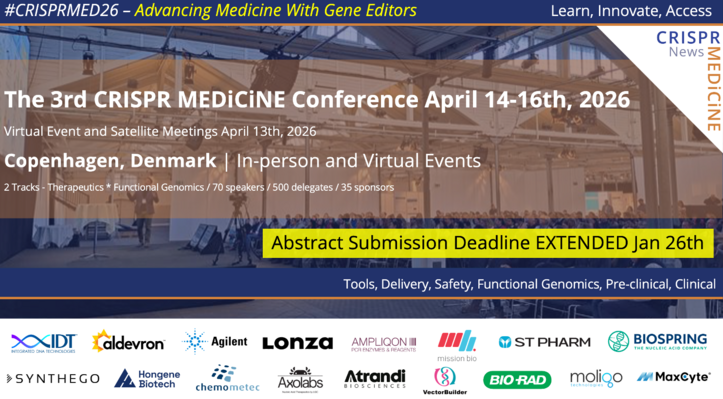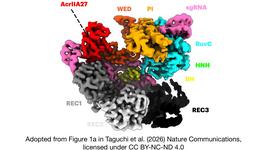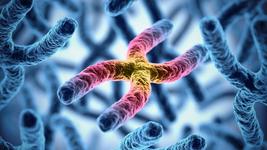CMN Weekly (6 May 2022) - Your Weekly CRISPR Medicine News
By: Gorm Palmgren - May. 6, 2022
CMN Intelligence - The World’s Most Comprehensive Intelligence Platform for CRISPR-Genomic Medicine and Gene-Editing Clinical Development
Providing market intelligence, data infrastructure, analytics, and reporting services for the global gene-editing sector. Read more...
Top picks
- American researchers have used targeted epigenomic editing to ameliorate excessive drinking in a rat model of adolescent alcohol exposure. Alcohol induces epigenetic reprogramming at the enhancer region of the activity-regulated cytoskeleton-associated protein (Arc) immediate-early gene, known as synaptic activity response element (SARE). It decreases Arc expression in the amygdala of both rodents and humans. The authors show that dCas9 fused to the histone acetyltransferase P300 increases histone acetylation at the Arc SARE and normalises deficits in Arc expression, leading to attenuation of adult anxiety and excessive alcohol drinking.
Research
- A method for probing low abundant DNA methylation by CRISPR-Cas12a-assisted cascade exponential amplification is described by researchers in China. The method reveals high sensitivity, which can distinguish as low as 0.01% methylation levels from the mixtures, paving the way toward accelerating methylation-based cancer diagnostics and management.
- Chinese researchers report a kind of targeted core-shell nanoparticles for the robust non-viral delivery of the gene-editing system to treat metastatic breast cancer. The nanoparticles effectively facilitate the precise insert and stable expression of a CCCTC-binding factor (CTCF) gene inhibiting metastatic breast cancer cells' migration, metastasis, and colonisation.
- Researchers in Spain have used CRISPR-Cas9 inhibit lactate dehydrogenase (LDH) in a mouse model of primary hyperoxaluria type 1 and 3 (PH1 and PH3). In addition, a single-dose in vivo delivery of AAV8 vectors expressing the CRISPR-Cas9 system resulted in reduced urine oxalate levels and kidney damage without signs of toxicity.
- Researchers in China have developed a hydrogen peroxide-triggered chemical strategy for controlling the CRISPR system. The system comprises introducing a protective group on the 2'-OH position of the guide RNA to inhibit RNA-guided nucleic acid cleavage. Subsequently, the addition of endogenous hydrogen peroxide restores the original function of the gRNA and activates CRISPR.
Industry
- Gamida Cell has presented new data indicating enhanced potency and persistence of GDA-301 for patients with solid and haematological cancers and other serious diseases. GDA-301 is a CRISPR-based therapy using engineered NAM-NK cells with the knockout of the immune checkpoint CISH.
- Metagenomi has presented findings on identifying novel families of compact, programmable enzymes for genome editing called SMART (SMall ARchaeal-associaTed). SMART systems are distinguished from other gene-editing systems, such as CRISPR/Cas9, by their small size (ranging from 450–1050 amino acids), their genomic organisation, and guide and target recognition motifs.
- Graphite Bio has announced FDA Fast Track Designation granted to GPH101 to treat sickle cell disease (SCD). GPH101 is the first CRISPR-based therapy candidate designed to correct the point mutation in the haemoglobin subunit beta gene (HBB) that causes SCD. You can read more about this story in our recent Clinical Update.
- Editas Medicine has announced ex vivo and in vivo preclinical data for its experimental medicine EDIT-103 to treat rhodopsin-associated autosomal dominant retinitis pigmentosa (RHO-adRP). In non-human primates, EDIT-103 demonstrated nearly 100% knockout of endogenous RHO, and the replacement RHO gene produced over 30% of normal RHO protein levels in the treated area of subretinal injection.
- Scribe Therapeutics has expanded its collaboration with Biogen to include an option for an additional disease target in gene therapy. In 2020, Scribe announced their research collaboration with Biogen to develop and commercialise CRISPR-based therapies that address an underlying genetic cause of Amyotrophic Lateral Sclerosis (ALS).
Financial reports
- Several CRISPR companies reported first-quarter 2022 financial results and operational highlights during the week. These included: Iovance Biotherapeutics, Intellia Therapeutics, Allogene Therapeutics, Fate Therapeutics, Sangamo Therapeutics and Editas Medicine.
News from ASGCT
- Several companies will present new results from ongoing gene-editing studies at the American Society of Gene & Cell Therapy (ASGCT) 25th Annual Meeting that is being held 16-19 May in Washington, DC: Beam Therapeutics, Precision Biosciences, Poseida Therapeutics, Edigene, Caribou Biosciences, Sangamo Therapeutics, Editas Medicine, Graphite Bio, Metagenomi, Arbor Bio and Century Therapeutics.
Detection
- Spanish researchers present CASCADE (CRISPR-CAS-based Colorimetric nucleic Acid DEtection), a sensing system for fast and specific naked-eye detection of SARS-CoV-2 RNA. The system employs the collateral RNase activity of Cas13a that, upon target recognition, cleaves ssRNA oligonucleotides conjugated to gold nanoparticles. This induces their colloidal aggregation, which can be easily visualised.
- Researchers in China have reported a CRISPR-Cas14a-based system for the rapid and isothermal detection of circulating microRNAs that serve as important biomarkers for the early diagnosis of cholangiocarcinoma. Cas14a was efficiently activated by a single-stranded SDA amplicon which improved the sensitivity by 2.86 times compared to that using Cas12a.
- Researchers in Vietnam present a CRISPR-Cas12a-based assay that can detect Neisseria meningitis - a cause of severe meningitis and sepsis - at 40 copies/reaction in less than two hours. The assay takes advantage of loop isothermal amplification (LAMP), and results are easily detected with fluorescent read-outs.
Reviews
- A review by researchers in France looks at new gene-editing tools to treat inherited retinal dystrophies (IRDs). The review highlights the CRISPR-Cas9 technology that has been used in vivo and the recent first-in-human application of CRISPR-Cas9 in an IRD.
- Chinese researchers look at various CRISPR-Cas reporters and signal transducers in diagnostics and biosensing. The review summarises the methodologies for monitoring Cas enzymes' activation and discusses design strategies for CRISPR-Cas reporters.
- The current progress of mitochondrial genome editing by CRISPR is discussed in a review by Chinese scientists. The authors discuss the challenge of delivering exogenous gRNAs into mitochondria and the potential for using mitochondrial localisation signals (MLS).
- A review by American researchers discusses recent advances in CRISPR-based systems to detect foodborne pathogens. The authors briefly introduce and classify the various CRISPR-Cas protein effectors that have thus far been used in biosensors and assess the current state of CRISPR technology in food-safety contexts.
- Researchers from Indonesia discuss the potential of CRISPR-Cas9 gene editing to treat Duane Retraction Syndrome (DRS), a genetic disease characterised by limited eye movement. In addition, the authors discuss gRNA design strategies for correcting a disease-causing mutation in the CHN1 gene.
- A review by American researchers looks at CRISPR-Cas therapeutic strategies for autosomal dominant disorders. Moreover, the authors detail how recent advancements in CRISPR are altering the landscape for future therapies.
Webinars and courses
- Australian researchers present CRISPR 101 - a novel online learning course harnessing innovative ways to teach a complex biomolecular technology. The course integrates videos, research articles, interviews, and other resources, al- lowing for self-paced learning. At the same time, the extensive resources also provide opportunities to delve deeper into the content for advanced learners.
- A 42-minute long video presentation by Horizon Discovery discusses ways to optimise homology-directed repair (HDR) results with CRISPR-Cas9. The webinar will give recommendations for the design of synthetic oligo or plasmid donor templates and techniques to evaluate HDR cell lines for the desired mutation.
News from CRISPR Medicine News
- Monday's feature was about a CRISPR-based therapy for the metabolic liver disease phenylketonuria (PKU). Gerald Schwank demonstrated that in vivo prime editing in neonate mice could correct a disease-causing mutation and lead to a clinically relevant reduction of blood phenylalanine.
- The clinical update on Wednesday reported that the FDA recently granted Orphan Drug Designation to Allogene's AlloCAR T candidate ALLO-605 to treat relapsed or refractory multiple myeloma. In addition, Graphite Bio was granted Fast Track Designation to its CRISPR-edited cell therapy candidate GPH101 to treat sickle cell disease.
- On Tuesday, our sister-site CRISPR AgroBio News (CARBON) launched its bi-weekly newsletter with links to recent news from CRISPR in agriculture. The top story was that federal authorities in Belgium had granted permission to perform three new field trials with CRISPR gene-edited maise.
- Thursday, we published CMN Markets - our monthly CRISPR Stocks and Market News update. Unfortunately, April was somewhat of a rough month on the stock market, and this impacted biotechnology stocks.
To get more of the CRISPR Medicine News delivered to your inbox, sign up to the free weekly CMN Newsletter here.
Tags
CLINICAL TRIALS
IND Enabling
Phase I
Phase II
Phase III
Gastric Cancer and Colorectal Cancer, CRC, (NCT07166263)
Sponsors:
Base Therapeutics (Shanghai) Co., Ltd.
Sponsors:
Base Therapeutics (Shanghai) Co., Ltd.
IND Enabling
Phase I
Phase II
Phase III
Relapsed or Refractory Acute Myeloid Leukemia, AML, (NCT06541444)
Sponsors:
Base Therapeutics (Shanghai) Co., Ltd.
Sponsors:
Base Therapeutics (Shanghai) Co., Ltd.
IND Enabling
Phase I
Phase II
Phase III







